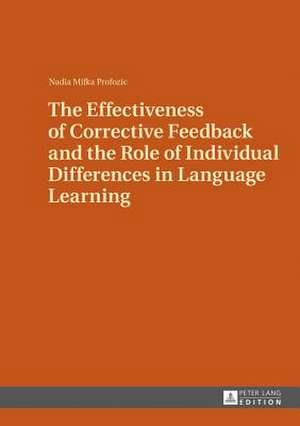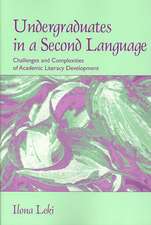The Effectiveness of Corrective Feedback and the Role of Individual Differences in Language Learning
Autor Nadia Mifka Profozicen Limba Engleză Hardback – 2 sep 2013
Preț: 422.53 lei
Preț vechi: 548.74 lei
-23% Nou
Puncte Express: 634
Preț estimativ în valută:
80.86€ • 87.80$ • 67.92£
80.86€ • 87.80$ • 67.92£
Carte tipărită la comandă
Livrare economică 22 aprilie-06 mai
Preluare comenzi: 021 569.72.76
Specificații
ISBN-13: 9783631625989
ISBN-10: 3631625987
Pagini: 192
Ilustrații: illustrations
Dimensiuni: 150 x 211 x 18 mm
Greutate: 0.34 kg
Editura: Peter Lang Gmbh, Internationaler Verlag Der W
ISBN-10: 3631625987
Pagini: 192
Ilustrații: illustrations
Dimensiuni: 150 x 211 x 18 mm
Greutate: 0.34 kg
Editura: Peter Lang Gmbh, Internationaler Verlag Der W
Notă biografică
Nadia Mifka Profozic teaches Second-language acquisition and English language teaching methodology at the University of Zadar (Croatia). She holds a PhD and a MTESOL from the University of Auckland. A former journalist and a language teacher, she has taught English as a foreign language, English as a second language and French in Croatia and New Zealand.
Cuprins
Contents: Classroom research - Corrective feedback - Recasts vs. clarification requests - Experimental research - Language learning - Cognitive and affective individual difference factors - Analytic ability - Working memory - Anxiety.








